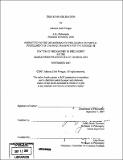Essays on obligation
Author(s)
Finegan, Johanna Goth
DownloadFull printable version (6.223Mb)
Other Contributors
Massachusetts Institute of Technology. Dept. of Linguistics and Philosophy.
Advisor
Judith Jarvis Thomson.
Terms of use
Metadata
Show full item recordAbstract
In the first chapter, "Supererogation and Defenses of Modest Moral Demands," I argue that a range of recent approaches to defending the "ordinary morality" view that the demands of morality are fairly modest make it hard to see how there could be any supererogatory acts, and therefore sacrifice one aspect of our intuitive view of morality in an attempt to preserve another. I go on to consider some difficulties in accommodating supererogation that defenders of "ordinary morality" might face more generally. In the second chapter, "Deontological Judgments about Belief," I address the problem of how deontological judgments about belief can ever be true, given that the apparently involuntary nature of belief seems incompatible with the sort of responsibility needed for deontological judgments. I consider and reject arguments which purport to show that we have the right sort of voluntary control over beliefs, as well as arguments which purport to show that considerations of voluntary control are altogether irrelevant to whether deontological judgments about belief can be true. I argue instead that deontological judgments about belief can be true in virtue of our participation in self-deceptive practices, something over which we do have the right kind of control. In the third chapter, "Belief and Commitment" I consider arguments to the effect that we must sometimes violate epistemic norms in order to enjoy the goods of friendship and other social relationships and in order to give those we are in relationship with their due. I raise some worries for such views and then argue that we can enjoy the goods and fulfill the obligations of social relationships without paying such a price, that an alternative attitude, which I call commitment, can get us at least most of the riches of social relationship without the costs of irrational, self-deceived belief.
Description
Thesis (Ph. D.)--Massachusetts Institute of Technology, Dept. of Linguistics and Philosophy, 2007. Includes bibliographical references.
Date issued
2007Department
Massachusetts Institute of Technology. Department of Linguistics and PhilosophyPublisher
Massachusetts Institute of Technology
Keywords
Linguistics and Philosophy.